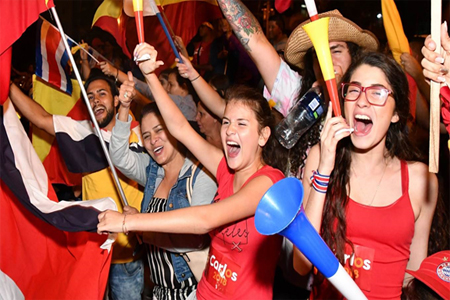
Afrasianet - Moscow - Konstantin Sonin - It is hard to imagine a positive headline this year featuring the words “Russia” and “global impact.” If anything, the international news media seem to be competing to provide the most lurid possible coverage of Russia under President Vladimir Putin. And yet, in two months, when Russia hosts the soccer World Cup – the world’s most-watched sporting event – it will make just such a positive contribution on the international stage.
Some observers will view the 2018 World Cup in terms of Putin’s effort to project “soft power,” and as an occasion for corrupt Russian officials to feather their nests. But that interpretation is too glib. In fact, the Kremlin would benefit even more from staging a well-organized event. And with nearly two million tickets already sold, the 2018 World Cup is on track to be a major success.
The people purchasing tickets want to be part of an international festival at which the world’s best soccer players compete. Their goal is not to make a political statement. Likewise, the Kremlin has not exploited the World Cup for propaganda purposes any more than previous hosts have done. Whether it was Germany, South Africa, or Brazil, all have used the occasion to burnish their reputations for hospitality and openness.
Moreover, in June 2017, FIFA published the full report from former US Attorney Michael J. Garcia’s 2014 investigation into the bidding process for hosting the 2018 and 2022 World Cups. The Garcia report shows that Russia desperately wanted to host the event, and that Putin even made personal appeals to other countries’ voting officials; yet it finds no evidence of collusion, bribery, or any other rule violations. At a time when Russia’s domestic corruption and international rule-breaking dominate global headlines, it is understandable if that finding comes as a surprise.
To be sure, government-financed projects in Russia are notoriously crooked, and allegations of corruption swirled around the preparations for the 2014 Olympic Games in Sochi. But in the case of the World Cup infrastructure, large-scale fraud, theft, and graft is unlikely to have occurred. Upgrades to airports, transportation systems, and tourist services in the host cities all had to satisfy international standards.
The same is true for stadium construction, which has also been subject to intense public scrutiny. Each project was tendered through a competitive selection process, and the final costs were comparable to stadium construction projects elsewhere in Europe.
At any rate, it is worth remembering that Russia already hosted the Confederations Cup last year, bringing together the current World Cup holder, the host country, and the six current regional champions. As a warm-up for the main event this year, the Confederations Cup was a success in terms of logistics and fan satisfaction.
It is hard to overstate the social impact the World Cup will have within Russia. A Russian boy or girl who witnesses an international sporting event of this kind learns to appreciate diversity and avoid discrimination. From flyers and posters to the opening ceremonies, they will watch young women and young men from a host of different countries participate alongside one another as a nod to gender equality. And in the celebrations surrounding the Cup, the LGBT community, which faces systematic persecution in Russia, will have a safe opportunity to take part in civic and social life.
Moreover, for the residents of the provincial Russian cities where most of the games will take place, the experience of hosting tens of thousands of fans from other countries will be as eye-opening as the period immediately following the fall of the Iron Curtain. When I attended a Confederations Cup game in Kazan last June, the referee and linesmen were Saudi Arabian, another official was Iranian, and another was American. For those who view the world through a zero-sum geopolitical lens, such a sight offers the powerful corrective of cooperation and collegiality.
FIFA estimates that some 250 million people in more than 220 countries play soccer. The game’s worldwide fan base, meanwhile, is more than 1.3 billion. Most countries’ citizens do not even dream of seeing their national team win the World Cup; nonetheless, they follow every second of their team’s games. After all, unlike in professional leagues, where a team’s performance tends to track its financial resources, national-level soccer offers even the smallest countries a fair shot. That’s why tiny Uruguay is a two-time champion, and why the Netherlands prides itself as a three-time runner-up.
Academic research has demonstrated that sporting mega-events such as the World Cup and the Olympics deliver few direct economic benefits to the host countries. But the same research has found that the people living in those countries consistently experience significantly increased happiness during and after the events.
I saw this first-hand in Kazan last June, when Russia played Mexico in the qualifying round for the Confederations Cup semifinals. Russia lost, after its goalkeeper made a silly mistake and its best player was ejected for hitting an opponent. Yet the stadium was beautiful, the event was well organized, and 40,000 fans enjoyed a wonderful evening.
It is hard to believe that Russia’s national team will win the World Cup this July. But there is every reason to believe that Russia will be an excellent host for an important, unifying global event.

